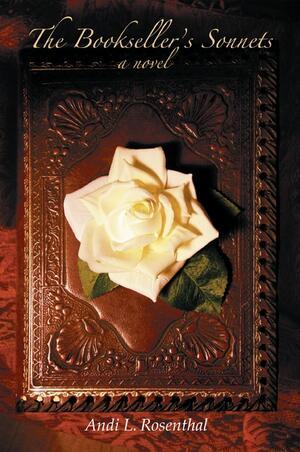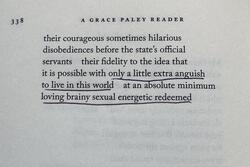'The Bookseller’s Sonnets': Andi L. Rosenthal's debut novel
March 2005 was the absolute worst month of Andi L. Rosenthal’s life. She broke off her engagement to her fiancé. Ten days later her father died suddenly of a cerebral hemorrhage. Then she lost her job.
Rosenthal was understandably lost. “It was [writing] the book that brought me back to life,” she said. “I couldn’t live in my life, so I made one up.” The book to which she referred is The Bookseller’s Sonnets, her debut novel, and the life she invented was that of Jill Levin, the book’s protagonist.
The Bookseller’s Sonnets is a multilayered fictional story of interfaith relationships and hidden identities spanning five centuries. It chronicles the story of a mysterious package from an anonymous artifact donor that arrives at the desk of Jill Levin, senior curator at the Museum of Jewish Heritage in Lower Manhattan. The artifact appears to be a diary written by Margaret More, the eldest daughter of Saint Thomas More, legal advisor to Henry VIII. As Levin works with colleagues to authenticate the diary (using clues from letters arriving to her from the Holocaust survivor who donated it), representatives from the Archdiocese of New York move in to lay claim to it in an attempt to prevent its explosive contents from becoming public.
The novel’s narrative weaves back and forth through time from Medieval England to Holocaust-era Germany to contemporary Manhattan. By means of detailed and accurately portrayed curatorial sleuthing, Rosenthal connects the seemingly disparate lives of three women, all of whom deal with issues of religious loyalty, family responsibility and personal fulfillment.
In reality, not much is known about Margaret More, the eldest daughter of King Henry VIII’s lawyer and confidant (before the king had him beheaded for treason). Rosenthal first became interested in her when she studied female Catholic mystics in college. She was intrigued by the fact that although none of the female More’s writings survived, the Archbishop of Canterbury praised her and many works were published under her husband’s name. “It was very shady to me,” explained the author. “I wanted to - at least fictionally - give voice to a 16th century woman who never got to be heard.”
Rosenthal worked in marketing and communications at the Museum of Jewish Heritage, from 1999 to 2004. “It was at the Museum that I learned how powerful stories that are told through physical artifacts can be,” she said. She also learned there the importance of bearing historical witness to the history of one’s people. “I was homesick for the Museum, so I decided to set the contemporary part of the story there,” Rosenthal explained. “But it wasn’t just about my attachment to the place. It was also about how it would enable me to bring in the idea of choosing to holding on to Jewish identity at all costs, as so many Shoah victims and survivors did.” For the novel’s main character, bearing witness is not merely professional. The granddaughter of Holocaust survivors, herself, Jill Levin struggles with whether to hide from or reveal to her family her serious romantic relationship with a non-Jew.
Levin, whose boyfriend is supportive of and genuinely interested in her Jewish identity and practice, doesn’t end up abandoning her religious upbringing as her grandmother fears she will.
Rosenthal, on the other hand, has abandoned the religion of her birth in favor of another. Her journey toward conversion to Judaism culminated in 2002, when she was working at the Museum. “Judaism really took root in me, and I had to find a way to write about it,” the author said.
Rosenthal, the offspring of an interfaith marriage, grew up “very Catholic” in Tuckahoe, NY. She and her sister, with their conspicuously Jewish last name, attended Catholic schools and churches.
The author, despite her having undergone all the sacraments, gravitated toward Judaism from an early age. “I would attend Bar and Bat Mitzvah ceremonies of friends at the age of 13, and when I heard the Hebrew, my heart would stand still.” Later, she pursued Jewish studies in college. “Sometimes religious identity is something we are told. But sometimes it’s something we discover for ourselves,” she mused.
The novel’s theme of religious intrigue and changing religious identities from one generation to the next is pulled directly from Rosenthal’s family history. She wrote The Bookseller’s Sonnets, in large part, to confront and deal with challenging and lingering questions: Why did her (Jewish) paternal grandparents end up with only one Jewish grandchild – Rosenthal herself? Why did Rosenthal’s engagement to a Jewish man not work out because of religious differences, when so many interfaith couples manage to work things out? And why did her father wait until just a month before Rosenthal converted to Judaism to finally reveal to her that her paternal grandmother was also a convert to Judaism?
The Bookseller’s Sonnets was published by 0 Books in September. A special launch event took place at The Museum of Jewish Heritage on October 24th, and Rosenthal will embark on a book tour organized by the National Jewish Book Council in early 2011.
Renee Ghert-Zand is a writer and Jewish educator who blogs at Truth, Praise & Help. She lives in Palo Alto, CA.







I have read this book. It is brilliant. Are you going to write any more books?
I have got to have this novel now. It sounds wonderfully intriguing. I love novels with strong female leads. Five centuries of it too. How great is that. I love that she is giving a voice to the 16th century women.
Kudos to you Rosenthal!
This is a really compelling "booktalk" that makes me eager to read the book. It reminds me of People of the Book in a way. I love speculative alternative history! The back story makes it all the more interesting. Thanks for sharing this piece on the December Jewish Book Carnival!
Renee,
This sounds like a terrific book to add to my reading list. I'm always looking for Jewish-themed books with novels - and intrigue. I am curious. What is your view of the author's writing? I get a sense of the book's storyline, but not so much the style of the writer. Is it a fast-paced read? Is the writer flowery or concise in her language? I'll of course make up my own mind when I see it, but would like to know what you think.
Linda
Author of the Jewish Muse, a Writer's Blog on Faith and Family. http://jewishmuse.com
Your excellent review compels me to purchase the book..it sounds like one I would definitely be interested in reading.